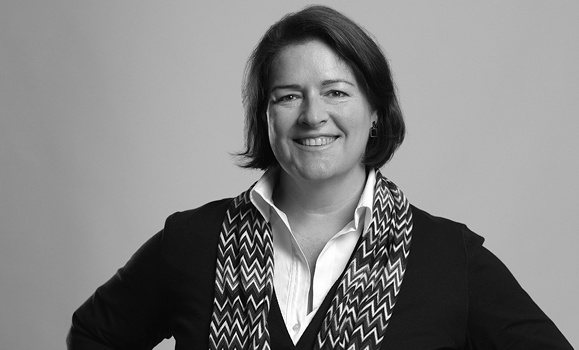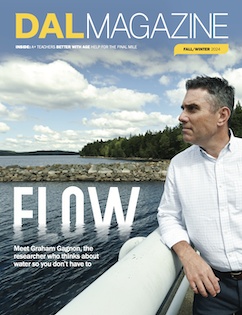Dogs on the scent... of trauma Healthy
Health People, Communities, and Populations
Researchers: Laura Kiiroja, Dr. Sherry Stewart, Dr. Simon Gadbois
Dogs’ sensitive noses can detect the early warning signs of some dangerous medical conditions and now scientists say they may even be able to sniff out an oncoming post-traumatic stress disorder (PTSD) flashback.
A Dalhousie-led study showed that some PTSD service dogs could detect these episodes via a person’s breath. Dogs can help patients by alerting to and inter- rupting episodes when their companions are struggling with their symptoms. If dogs could respond to stress markers on the breath, they could interrupt episodes at an earlier stage, making their interventions more effective.
The multidisciplinary scientists recruited humans who have experienced trauma as scent donors and two dogs—Ivy and Callie —skilled enough to complete the study. Ivy and Callie were presented with a series of samples to see if they could accurately detect stress compounds in breath. Ivy achieved 74 per cent accuracy and Callie achieved 81 per cent accuracy.
Further reading: Catching the scent: Dal pilot study shows dogs can smell trauma
Most plastic pollution linked to 56 companies
Sustainable Ocean
Researchers: Dr. Tony Walker (Dalhousie), University of California, University of Tasmania, Break Free from Plastic, Portland State University, Silliman University, 5 Gyres Institute, Massey University, Estonian University of Life Sciences, DePauw University, Smithsonian Environmental Research Center, Stockholm University, University of Exeter.

A volunteer cleans up the shoreline.
Researchers have drawn a clear, quantifiable link between plastic production and plastic pollution, while also determining that companies producing single-use consumer goods disproportionately contribute to the problem.
The international team determined that 56 global companies are responsible for more than half of all branded plastic pollution, with the top five producers being Coca-Cola Company, PepsiCo, Nestlé, Danone, and Altria/Philip Morris International.
The five-year analysis used datanfrom almost 1,580 audit events in 84 countries, where volunteers cleaned up waste and documented the brands collected. More than 50 per cent of the recovered plastic items were unbranded, highlighting the need for better transparency about production and labeling of plastic products to enhance traceability and accountability.
Further reading: Study reveals more than half of branded global plastic waste linked to just 56 companies
Simple intervention eases seniors’ sleeping pill dependence
Health People, Communities, and Populations
Researchers: Dr. David Gardner, Dr. Andrea Murphy, Dr. Malgorzata Rajda (Dalhousie), University of New Brunswick, Monash University
Seniors taking sleeping pills can significantly reduce their dependence on the medications and improve their sleep with a simple intervention that is safer and more effective, but unfamiliar to many.
Dalhousie researchers evaluated whether specially designed information packages mailed directly to seniors’ homes in New Brunswick could help them reduce their need for sleeping pills, while also helping them get a better sleep.
Two groups received different information packages (Sleepwell or EMPOWER) outlining ways to reduce usage, while a control group didn’t receive anything by mail.
The researchers found that more people receiving the Sleepwell package stopped or reduced their use of sleeping pills compared to the other two groups. About 26 per cent in the Sleepwell group stopped taking sleeping pills altogether by six months. For EMPOWER, the rate was 20 per cent and in the control group it was 7.5 per cent.
Further reading: Kicking a sleeping pill habit possible for seniors with a simple intervention, study shows
Study empowers Nova Scotia pharmacists to directly prescribe HIV prevention drug
Healthy People, Communities, and Populations
Researchers: Dr. Kyle Wilby

Dale Lemieux
Canadians have access to a drug that prevents HIV infection, but it’s not getting into the hands of those who need it most. Health researcher Dr. Kyle Wilby, director of Dalhousie’s College of Pharmacy is tackling the issue by collaborating with policymakers A dog's nose knows A volunteer cleans up the shoreline to make Nova Scotian pharmacists among the first in the country with the ability to prescribe the lifesaving medication.
While antiretroviral therapies have significantly diminished the dangers of HIV, the virus is still very much with us. Statistics Canada counted 1,833 new diagnoses in 2022, a 25 per cent increase over 2021. And Canadians continue to die of the virus—133 in 2021.
Dr. Wilby, saw a solution at the pharmacist’s counter. Embedded in every neighborhood, he says pharmacies provide ready access to health professionals who specialize in the proper use of medication. He says giving them the power to prescribe the drug is a natural fit with their expanding role relieving pressure on taxed health care systems.
Further reading: Dal Solutions: Dalhousie study helps give Nova Scotia pharmacists the power to directly prescribe HIV prevention drug
Researcher tackling violence against women from inside Nova Scotia’s health care system
Healthy People, Communities, and Populations
Researchers: Dr. Alexa Yakubovich

Community health researcher Dr. Alexa Yakubovich is ad- dressing Nova Scotia’s high rate of violence against women by embedding within IWK Health to work more closely with front-line health professionals.
According to Statistics Canada, 44 per cent of women who have had an intimate partner relationship report experiencing abuse. To get closer to the issue, Dr. Yakubovich has started a new program funded by Canadian Institutes of Health Research that allows her to work directly with programs that are most likely to see patients experiencing violence.
Her initial goal is to understand initiatives currently in place at the IWK and other organizations to link them and maximize their impact. She also aims to develop processes to capture reported violence safely and privately on health records to reveal the scope of the problem, identify programs most likely to treat patients experiencing violence, and better connect patients with support.
Further reading: Dal Solutions: Researcher tackling violence against women from inside Nova Scotia’s health‑care system
Hydrologist positioned to take a global lead in atmospheric carbon dioxide removal
Climate Tech and Clean Energy
Researchers: Dr. Shannon Sterling

While pursuing research aimed to restore Nova Scotia salmon habitats, Dalhousie hydrologist Dr. Shannon Sterling made a discovery that allowed her to take a leading role at the forefront of carbon dioxide removal science. It also opened the door to the launch of CarbonRun, a promising carbon dioxide removal company that she launched with co-founder and Dal alumnus Dr. Edmund Halfyard.
Drs. Sterling and Halfyard had been trying to save what remains of Nova Scotia’s wild salmon stocks by studying the addition of limestone to rivers, a process that combats their acidification. Emerging studies showed that adding the alkaline materials also had the potential to enhance the absorption of CO2 from the air. The coincidence was a major “aha” moment—they could revive habitats while counteracting global warming.
Related listening: Meet Shannon Sterling, environmental scientist
The strength of CarbonRun’s science has attracted major global attention, including the Frontier Carbon Removal Fund which was founded by companies like Google, Meta, and Shopify. Frontier made an advance market commitment, a pre-purchase of carbon credits to provide a significant financial boost to advance and scale CarbonRun’s research and operations.
Further reading: Where Ideas Meet Impact: Hydrologist's research positions her to take a global lead in atmospheric carbon dioxide removal
Dalhousie sociologist to cultivate network to reduce Canadian agricultural emissions
Sustainable Food Systems
Researchers: Dr. Karen Foster

Canada has committed to cutting agricultural emissions by 30 per cent below 2020 levels by 2030. It is an ambitious goal that’s going to take significant commitment and collaboration from farmers and the 2.3 million people employed in Canada’s agri-food systems that generate seven per cent of the country’s gross domestic product.
It’s a diverse group whose livelihood often depends on tight margins and the use of fossil fuels. Introducing policies to pursue a net-zero future is not a straightforward task. This is where Dalhousie sociologist Dr. Karen Foster comes in.
Dr. Foster has been selected to lead a $1.9-million initiative supported by Agriculture and Agri-Food Canada and the Social Sciences and Humanities Research Council to develop a new national research network that supports an equitable tran- sition to net-zero in Canadian agriculture and its periphery industries.
Further reading: Dalhousie sociologist receives $1.9M to cultivate network aimed at reducing emissions in Canadian agriculture
This story appeared in the DAL Magazine Fall 2024 issue. Flip through the rest of the issue using the links below.


